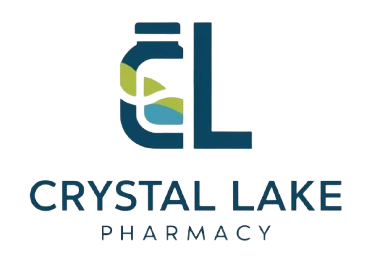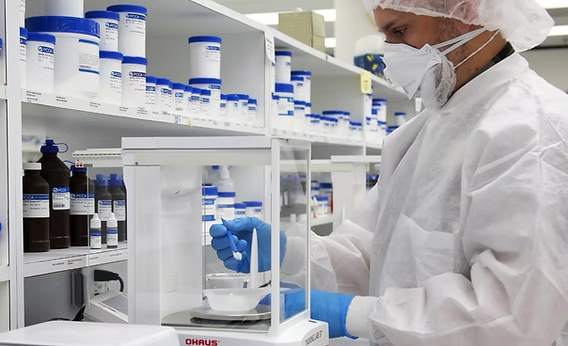Yes, you can easily tell if a pharmacy is a compounding pharmacy by looking for specific signs, certifications, and services they offer. A compounding pharmacy creates custom medications from scratch to meet your unique health needs when regular pharmacy options won’t work.
This guide will show you exactly what to look for, what questions to ask, and how to find a quality compounding pharmacy you can trust.
What Makes a Pharmacy a Compounding Pharmacy?
A compounding pharmacy is any pharmacy that makes medications that aren’t available from drug companies. According to Harvard Health, “Any pharmacy that provides medications that are not commercially available and prepares them onsite to meet your specific needs is a compounding pharmacy.”
These special pharmacies mix pure chemicals and active ingredients to create one-of-a-kind medications. They can change the strength, remove allergens, or make pills into liquids for people who can’t swallow tablets.
Out of about 56,000 community pharmacies in the United States, only about 7,500 specialize in compounding services. This means most people haven’t heard of them until they need one.
Key Services That Show It’s a Compounding Pharmacy
Look for these services on their website or in their pharmacy:
- Custom medication strengths not sold in stores
- Flavor adding for children’s medicines
- Allergy-free formulations (no lactose, gluten, or dyes)
- Pain creams and topical treatments
- Pet medications in easy-to-give forms
- Hormone replacement therapy
- Sterile injections for hospitals
Clear Signs You’re Looking at a Compounding Pharmacy
Physical Signs to Look For
When you visit or call a pharmacy, these signs tell you they do compounding:
Special Equipment: Look for mixing tools, scales, and clean rooms behind the counter. Compounding pharmacies need special spaces to make medications safely.
Custom Labels: Their medication bottles often say “compounded by” instead of showing a drug company name.
Specialized Staff: The pharmacists have extra training in mixing medications. Some are Board-Certified Sterile Compounding Pharmacists (BCSCPs).
Online and Marketing Clues
Website Services: Their website lists compounding as a main service, not just a side offering.
Patient Stories: They share examples of custom solutions they’ve created for patients with special needs.
Detailed Explanations: They explain what compounding is and why someone might need it.
Important Certifications That Matter
PCAB Accreditation – The Gold Standard
The Pharmacy Compounding Accreditation Board (PCAB) is “considered the gold standard for compounding pharmacies,” according to Harvard Medical School experts.
PCAB-accredited pharmacies must:
- Use only high-quality chemicals from trusted suppliers
- Follow strict safety rules
- Get regular inspections
- Train their staff properly
- Test their medications for quality
PCAB accreditation shows that a pharmacy “meet[s] the stringent criteria and demonstrate[s] their commitment to providing exceptional products and services.”
Other Important Certifications
USP Standards Compliance: Look for pharmacies that follow United States Pharmacopeia guidelines. These set safety rules for making medications.
State Licensing: All compounding pharmacies must have proper state licenses. Ask to see proof of current licensing.
Third-Party Testing: Good compounding pharmacies have outside labs test their medications for safety and strength.
Questions to Ask Any Compounding Pharmacy
Essential Safety Questions
Before trusting a compounding pharmacy with your health, ask these important questions:
“Are you licensed to ship to my state?” This confirms they can legally serve you.
“Do you have PCAB accreditation?” This is the top certification for quality and safety.
“What training do your pharmacists have?” Look for Board-Certified Sterile Compounding Pharmacists (BCSCPs) or similar credentials.
“Does a third-party lab test your medications?” This adds an extra safety check.
Quality Control Questions
“How do you ensure medication strength is correct?” They should explain their testing process.
“Where do you get your ingredients?” They should use USP-grade chemicals from reliable suppliers.
“What happens if there’s a problem with my medication?” They should have clear policies for handling issues.
Red Flags to Watch Out For
Warning Signs of Poor-Quality Compounding
Some compounding pharmacies cut corners or aren’t properly regulated. Avoid pharmacies that:
- Won’t answer questions about their certifications
- Can’t provide proof of licensing
- Don’t test their medications
- Make unrealistic promises about results
- Seem rushed or unprofessional
Online Pharmacy Concerns
Harvard Health warns that “when buying drugs online, you may not know whether the drug was produced by a compounder whose drugs meet appropriate quality standards, or whether the compounder is appropriately licensed and regulated.”
Be extra careful with online compounding pharmacies. Make sure they’re properly licensed in your state and have real pharmacists you can talk to.
Types of Compounding Facilities
503A Compounding Pharmacies
According to the FDA, 503A compounding pharmacies “compound according to prescriptions specific to particular patients and are required by state boards of pharmacy to comply with USP and other guidelines.”
These traditional compounding pharmacies:
- Make medications for individual patients
- Are regulated mainly by state pharmacy boards
- Can only dispense for home use
- Don’t make large batches
503B Outsourcing Facilities
503B compounding pharmacies are “outsourcing facilities that may manufacture large batches with or without prescriptions to be sold to healthcare facilities for office use only.”
These larger facilities:
- Follow stricter FDA manufacturing rules
- Can make medications without individual prescriptions
- Supply hospitals and clinics
- Must pass regular FDA inspections
How to Find a Quality Compounding Pharmacy
Using Professional Resources
Alliance for Pharmacy Compounding: This organization has a pharmacy locator tool to find certified compounding pharmacies near you.
Ask Your Doctor: Many doctors work with trusted compounding pharmacies and can recommend ones they know provide quality service.
Check State Pharmacy Boards: Your state’s pharmacy board can verify a pharmacy’s license and any complaints against them.
What Crystal Lake Pharmacy Offers
At Crystal Lake Pharmacy, we provide comprehensive compounding services including pain creams, pediatric formulations, veterinary medications, and custom oral capsules. Our experienced pharmacists follow strict safety standards to create personalized medications that meet your exact needs.
When You Might Need a Compounding Pharmacy
Common Reasons People Use Compounding
Allergy Issues: When you’re allergic to dyes, preservatives, or other ingredients in regular medications.
Dosage Problems: When you need a strength that drug companies don’t make.
Form Changes: When you need a pill turned into a liquid or cream.
Flavor Needs: When children won’t take bitter-tasting medicine.
Pet Medications: When your pet needs medicine in a form they’ll actually take.
Drug Shortages
The FDA explains that compounding pharmacies help during “drug shortages” by getting “access to chemical compounds directly from the drug manufacturer and mix[ing] the medication themselves.”
This happened recently with popular weight loss medications when demand was higher than supply.
Understanding the Risks and Benefits
Benefits of Using Compounding Pharmacies
Personalized Medicine: You get exactly what your body needs, not a one-size-fits-all approach.
Allergy Solutions: They can remove ingredients that cause reactions.
Better Compliance: When medication is easier to take, you’re more likely to stick with treatment.
Unique Solutions: They can solve problems that regular pharmacies can’t handle.
Important Safety Considerations
Compounded drugs “aren’t FDA-approved” which means “there’s no easy way to know for sure how safe and effective they are.”
However, good compounding pharmacies follow strict guidelines:
- Use only FDA-approved ingredients
- Follow USP safety standards
- Get regular inspections
- Test their products for quality
What to Expect During Your First Visit
The Consultation Process
A good compounding pharmacy will:
- Review Your Prescription: They’ll carefully read what your doctor ordered
- Ask Questions: They’ll want to know about allergies and preferences
- Explain the Process: They’ll tell you how they’ll make your medication
- Discuss Timeline: Most custom medications take 1-3 business days
- Provide Instructions: They’ll explain how to take and store your medication
Cost and Insurance Considerations
Compounded medications often cost more than regular pharmacy drugs. Many insurance plans don’t cover them, so ask about costs upfront.
Some compounding pharmacies offer payment plans or work with you to find affordable solutions.
Final Thoughts
Finding the right compounding pharmacy is important for your health and safety. Look for PCAB accreditation, proper licensing, and experienced pharmacists who take time to answer your questions.
The key signs of a quality compounding pharmacy include specialized equipment, custom services, proper certifications, and a focus on patient safety. Don’t hesitate to ask questions about their training, testing procedures, and quality controls.
If you need custom medications, contact Crystal Lake Pharmacy to discuss your specific needs. Our experienced team can help determine if compounding is right for you and create safe, effective solutions tailored to your health requirements.
Remember, the best compounding pharmacy is one that puts your safety first, maintains high standards, and takes the time to create exactly what your doctor ordered for your unique situation.

